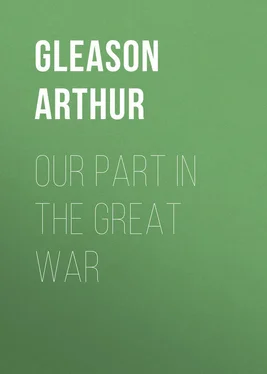Arthur Gleason - Our Part in the Great War
Здесь есть возможность читать онлайн «Arthur Gleason - Our Part in the Great War» — ознакомительный отрывок электронной книги совершенно бесплатно, а после прочтения отрывка купить полную версию. В некоторых случаях можно слушать аудио, скачать через торрент в формате fb2 и присутствует краткое содержание. Жанр: foreign_antique, foreign_prose, на английском языке. Описание произведения, (предисловие) а так же отзывы посетителей доступны на портале библиотеки ЛибКат.
- Название:Our Part in the Great War
- Автор:
- Жанр:
- Год:неизвестен
- ISBN:нет данных
- Рейтинг книги:5 / 5. Голосов: 1
-
Избранное:Добавить в избранное
- Отзывы:
-
Ваша оценка:
- 100
- 1
- 2
- 3
- 4
- 5
Our Part in the Great War: краткое содержание, описание и аннотация
Предлагаем к чтению аннотацию, описание, краткое содержание или предисловие (зависит от того, что написал сам автор книги «Our Part in the Great War»). Если вы не нашли необходимую информацию о книге — напишите в комментариях, мы постараемся отыскать её.
Our Part in the Great War — читать онлайн ознакомительный отрывок
Ниже представлен текст книги, разбитый по страницам. Система сохранения места последней прочитанной страницы, позволяет с удобством читать онлайн бесплатно книгу «Our Part in the Great War», без необходимости каждый раз заново искать на чём Вы остановились. Поставьте закладку, и сможете в любой момент перейти на страницу, на которой закончили чтение.
Интервал:
Закладка:
Nothing said here is meant to imply that the sum of all American efforts is comparable to the gift which the men of France and Belgium and England have made us. I am only saying that a minority in our population has seen that the Allies are fighting to preserve spiritual values which made our own past great, and which alone can make our future worthy.
That minority, inheriting the traditions of our race, bearing old names that have fought for liberty in other days, has clearly recognized that no such torture has come in recent centuries as German hands dealt out in obedience to German orders. In the section on French peasants, I have told of that suffering.
In another section, I am speaking to the Americans who remain indifferent to the acts of Germany. They are not convinced by the records of eye-witnesses. The wreck of Belgium is not sufficient. Will they, I wonder, be moved, if one rises from the dead. We shall see, for in this book I give the words of those who have, as it were, risen from the dead to speak to them. I give the penciled records of dead Germans, who left little black books to tell these things they did in Flanders and the pleasant land of France.
There are many persons who are more sincerely worried lest an injustice of overstatement should be done to Germany than they are that Germany has committed injustice on Belgium and Northern France. The burned houses and murdered peasants do not touch them, but any tinge of resentment, any sign of anger, in criticizing those acts, moves them to protest. Frankly, we of the historic tradition are disturbed when we see a wave of excitement pass over the country at the arrival of a German submarine – dinners of honor, interviews with the "Viking" – Captain – and, in the same month, a perfect calm of indifference greeting the report of the French girls of Lille sent away and of families broken up and scattered. We that are shocked by the cold system of the German conquerors, and publish the facts of their methodical cruelty, are rebuked by American editors and social workers as exercising our heart emotionally at the expense of our head. But that hysteria which greets a German officer, indirectly helping in the job of perpetuating the official German system of murder and arson, is accepted as American vivacity, a sort of base-ball enthusiasm, and pleasant revelation of sporting spirit.
We believe we are not un-American, in being Pro-Ally. We believe we are holding true to the ideas which created our country – ideas brought across from the best of England, and freshened from the soul of France. We believe that Benjamin Franklin was an American and a statesman when he wrote: —
"What would you think of a proposition, if I should make it, of a family compact between England, France and America? America would be as happy as the Sabine girls if she could be the means of uniting in perpetual peace her father and her husband."
Cheer the Deutschland in, and U-53, 1 1 Some of our people go further even than the giving of banquets to the efficient staff of the Deutschland . They give praise to U-53. In a newspaper, edited and owned by Americans, and published in an American Middle Western city of 40,000 inhabitants, the leading editorial on the exploits of U-53 was headed, "Hats Off to German Seamen," and the writer says: "The world in general that had educated itself to regard the German as a phlegmatic and plodding citizen will remove its headgear in token of approbation of the sustained series of sensational feats by German commanders and sailors. The entire aspect of affairs has been changed by the events of two years. The Germans have accumulated as much heroic and romantic material in that time as has been gathered by other nations since the date of the American Revolution." In the second section of this book, I have told why we talk like that. The mixture of races (mixed but not blended), the modern theory of cosmopolitanism, a self-complacency in our attitude toward Europe, an assumption that we alone champion freedom and justice, the fading of our historic tradition – these have caused us to preach internationalism, but fail to defend ourselves or the little nation of Belgium. They have led us to admire successful force.
but permit us to go aside a little way and mourn the dead of the Lusitania . All we ask, we that are held by some of the old loyalties, is that we be not counted un-American. We ask you to throw our beliefs, too, into the vast new seething mass. Let us contribute to the great experiment a little of the old collective experience. Because the marching feet of France strike a great music in our heart, do not hold us alien. We are only remembering what Washington knew. He was glad of the feet of those young men as they came tramping south to Yorktown.
In the immense labors of the naturalization factory, do not pause to excommunicate us, who find an ancient, unfaded freedom in England. We are moved as Lincoln was moved when he wrote to the operatives of Lancashire – Englishmen starving because of our blockade, starving but not protesting. Lincoln wrote: —
To the Workingmen of Manchester: I have the honor to acknowledge the receipt of the address and resolutions which you sent me on the eve of the new year. When I came, on the fourth of March, 1861, through a free and constitutional election to preside in the Government of the United States, the country was found at the verge of civil war. Whatever might have been the cause, or whosesoever the fault, one duty, paramount to all others, was before me, namely, to maintain and preserve at once the Constitution and the integrity of the Federal Republic. A conscientious purpose to perform this duty is the key to all the measures of administration which have been and to all which will hereafter be pursued. Under our frame of government and my official oath, I could not depart from this purpose if I would. It is not always in the power of governments to enlarge or restrict the scope of moral results which follow the policies that they may deem it necessary for the public safety from time to time to adopt.
I have understood well that the duty of self-preservation rests solely with the American people; but I have at the same time been aware that favor or disfavor of foreign nations might have a material influence in enlarging or prolonging the struggle with disloyal men in which the country is engaged. A fair examination of history has served to authorize a belief that the past actions and influences of the United States were generally regarded as having been beneficial toward mankind. I have, therefore, reckoned upon the forbearance of nations. Circumstances to some of which you kindly allude induce me expecially to expect that if justice and good faith should be practiced by the United States, they would encounter no hostile influence on the part of Great Britain. It is now a pleasant duty to acknowledge the demonstration you have given of your desire that a spirit of amity and peace toward this country may prevail in the councils of your Queen, who is respected and esteemed in your own country only more than she is by the kindred nation which has its home on this side of the Atlantic.
I know and deeply deplore the sufferings which the working-men at Manchester, and in all Europe, are called to endure in this crisis. It has been often and studiously represented that the attempt to overthrow this government, which was built upon the foundations of human rights, and to substitute for it one which should rest exclusively on the basis of human slavery, was likely to obtain the favor of Europe. Through the action of our disloyal citizens, the working-men of Europe have been subjected to severe trials, for the purpose of forcing their sanction to that attempt. Under the circumstances, I cannot but regard your decisive utterances upon the question as an instance of sublime Christian heroism which has not been surpassed in any age or in any country. It is indeed an energetic and reinspiring assurance of the inherent power of truth, and of the ultimate and universal triumph of justice, humanity, and freedom. I do not doubt that the sentiments you have expressed will be sustained by your great nation; and, on the other hand, I have no hesitation in assuring you that they will excite admiration, esteem, and the most reciprocal feelings of friendship among the American people. I hail this interchange of sentiment, therefore, as an augury that whatever else may happen, whatever misfortune may befall your country or my own, the peace and friendship which now exist between the two nations will be, as it shall be my desire to make them, perpetual.
Читать дальшеИнтервал:
Закладка:
Похожие книги на «Our Part in the Great War»
Представляем Вашему вниманию похожие книги на «Our Part in the Great War» списком для выбора. Мы отобрали схожую по названию и смыслу литературу в надежде предоставить читателям больше вариантов отыскать новые, интересные, ещё непрочитанные произведения.
Обсуждение, отзывы о книге «Our Part in the Great War» и просто собственные мнения читателей. Оставьте ваши комментарии, напишите, что Вы думаете о произведении, его смысле или главных героях. Укажите что конкретно понравилось, а что нет, и почему Вы так считаете.












